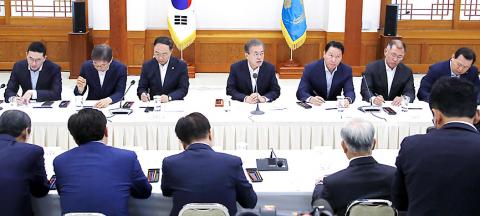South Korean President Moon Jae-in yesterday said Japan’s export curbs on key materials used by South Korean technology firms could be prolonged and his government would sharply boost spending to help reduce their reliance on Japanese suppliers.
Japan last week said it would tighten restrictions on exports of three materials used in smartphone displays and chips, citing a dispute with Seoul over South Koreans forced to work for Japanese firms during World War II.
The growing row threatens to disrupt supplies of chips and displays by South Korea’s tech giants Samsung Electronics Co and SK Hynix Inc, which count Apple Inc and other smartphone makers as customers and account for almost two-thirds of global chip production.

Photo: AP
“We can’t rule out the possibility that the situation would be prolonged, despite our diplomatic efforts to resolve the issue,” Moon said at a meeting with executives from South Korea’s top 30 conglomerates, including Samsung, Hyundai Motor Co and Lotte Group.
“It is a very regrettable situation, but we have no choice but to prepare for all possibilities,” Moon said, adding that the government would sharply increase spending to help firms source parts, materials and equipment domestically.
A “joint government-private sector response system is required as we are in an unprecedented emergency,” he said.
He also dismissed reported remarks by a politician in Japan that South Korea illegally shipped hydrogen fluoride imported from Japan to North Korea in contravention of international sanctions, calling them “groundless.”
Hydrogen fluoride, a chemical covered by the Japanese export curbs, can be used in chemical weapons.
“It is not desirable at all ... that Japan takes measures that deal a blow to our economy because of political purpose and makes remarks that link the measures to sanctions on North Korea,” Moon said.
South Korea’s bread-and-butter chip industry accounts for 20 percent of its exports.
“We will seek international cooperation as the measures will naturally have an adverse impact on the global economy,” Moon said.
Additional reporting by AFP

CHIP RACE: Three years of overbroad export controls drove foreign competitors to pursue their own AI chips, and ‘cost US taxpayers billions of dollars,’ Nvidia said China has figured out the US strategy for allowing it to buy Nvidia Corp’s H200s and is rejecting the artificial intelligence (AI) chip in favor of domestically developed semiconductors, White House AI adviser David Sacks said, citing news reports. US President Donald Trump on Monday said that he would allow shipments of Nvidia’s H200 chips to China, part of an administration effort backed by Sacks to challenge Chinese tech champions such as Huawei Technologies Co (華為) by bringing US competition to their home market. On Friday, Sacks signaled that he was uncertain about whether that approach would work. “They’re rejecting our chips,” Sacks

NATIONAL SECURITY: Intel’s testing of ACM tools despite US government control ‘highlights egregious gaps in US technology protection policies,’ a former official said Chipmaker Intel Corp has tested chipmaking tools this year from a toolmaker with deep roots in China and two overseas units that were targeted by US sanctions, according to two sources with direct knowledge of the matter. Intel, which fended off calls for its CEO’s resignation from US President Donald Trump in August over his alleged ties to China, got the tools from ACM Research Inc, a Fremont, California-based producer of chipmaking equipment. Two of ACM’s units, based in Shanghai and South Korea, were among a number of firms barred last year from receiving US technology over claims they have

BARRIERS: Gudeng’s chairman said it was unlikely that the US could replicate Taiwan’s science parks in Arizona, given its strict immigration policies and cultural differences Gudeng Precision Industrial Co (家登), which supplies wafer pods to the world’s major semiconductor firms, yesterday said it is in no rush to set up production in the US due to high costs. The company supplies its customers through a warehouse in Arizona jointly operated by TSS Holdings Ltd (德鑫控股), a joint holding of Gudeng and 17 Taiwanese firms in the semiconductor supply chain, including specialty plastic compounds producer Nytex Composites Co (耐特) and automated material handling system supplier Symtek Automation Asia Co (迅得). While the company has long been exploring the feasibility of setting up production in the US to address

OPTION: Uber said it could provide higher pay for batch trips, if incentives for batching is not removed entirely, as the latter would force it to pass on the costs to consumers Uber Technologies Inc yesterday warned that proposed restrictions on batching orders and minimum wages could prompt a NT$20 delivery fee increase in Taiwan, as lower efficiency would drive up costs. Uber CEO Dara Khosrowshahi made the remarks yesterday during his visit to Taiwan. He is on a multileg trip to the region, which includes stops in South Korea and Japan. His visit coincided the release last month of the Ministry of Labor’s draft bill on the delivery sector, which aims to safeguard delivery workers’ rights and improve their welfare. The ministry set the minimum pay for local food delivery drivers at